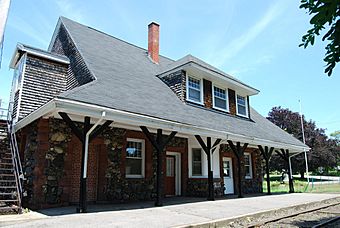Millis Center Historic District facts for kids
Quick facts for kids |
|
|
Millis Center Historic District
|
|
 |
|
| Location | Millis, Massachusetts |
|---|---|
| Area | 110 acres (45 ha) |
| Architect | Weston, Frank; McDonough, T.M.; Smith, George L. |
| Architectural style | Late Victorian, Late 19th And 20th Century Revivals |
| NRHP reference No. | 07000944 |
| Added to NRHP | September 14, 2007 |
The Millis Center Historic District is a special area in Millis, Massachusetts. It's like a time capsule showing what the town looked like in the mid-to-late 1800s. This historic district includes old homes, factories, and important town buildings.
You can find it along streets like Curve, Daniels, Exchange, Irving, Lavender, Main, and Union Streets. This area was officially added to the National Register of Historic Places in 2007. This means it's recognized as an important place in American history.
Contents
What Makes Millis Center Special?
How Millis Grew Over Time
The area that is now Millis was first settled by English people in the 1640s. For many years, it was part of a larger town called Medway. Millis became its own separate town in 1885.
The town center grew around two main roads. One went north and south, now called Massachusetts Route 115. The other went east and west, now known as Exchange, Curve, and Union Streets.
A straighter road, Main Street (now Massachusetts Route 109), was built in 1809. It was part of a turnpike connecting Hartford and Dedham. Later, a railroad was built through the area in the 1850s.
From Farms to Factories
Millis was mostly a farming community until the 1880s. That's when reliable train service made a big difference.
A man named Lansing Millis, who the town is named after, opened several factories. He started a shoe factory, a steel factory, and a bottling plant. These businesses helped Millis grow into an important industrial town.
Exploring the Historic District
The Millis Center Historic District covers about 110 acres (45 hectares). It stretches along Main Street and the curving path of Exchange, Curve, and Union Streets. It also goes north along Exchange Street.
Most of the buildings in the district were built after 1850. Only a few houses and one church, the First Parish Church, are older. The oldest house dates back to the mid-1700s. It's called the John Richardson house and is located at 191 Curve Street.



